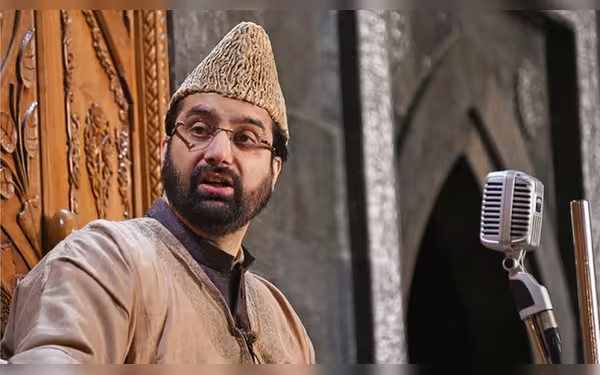Saturday, November 16, 2024 07:51 PM
Mirwaiz Umar Farooq: Elections Cannot Replace Kashmir Resolution Process
- Elections cannot substitute genuine Kashmir resolution process.
- Mirwaiz emphasizes dialogue over political processes.
- Humanitarian aspects of Kashmir conflict must be addressed.
 Image Credits: dailytimes_pk
Image Credits: dailytimes_pkMirwaiz Umar Farooq asserts elections cannot replace the genuine resolution process for the Kashmir dispute, emphasizing the need for dialogue.
The Kashmir dispute has been a long-standing issue between India and Pakistan, with roots that trace back to the partition of British India in 1947. This conflict has not only affected the political landscape but has also deeply impacted the lives of the people living in the region. Recently, amidst what many are calling 'sham elections' in Indian illegally occupied Jammu and Kashmir, Mirwaiz Umar Farooq, a senior leader of the All Parties Hurriyat Conference (APHC), has voiced his concerns regarding the ongoing situation.
In a recent interview, Mirwaiz emphasized that elections cannot serve as a substitute for a genuine resolution process for the Kashmir dispute. He stated, "The Hurriyat will always support engagement with the sentiment and deliberations on Kashmir." This highlights the importance of dialogue over mere political processes, suggesting that the voices of the people must be heard and considered in any discussions about the future of Kashmir.
Mirwaiz pointed out the complexities surrounding the Kashmir issue, noting that it is not just a territorial dispute but also a significant political and humanitarian concern. He raised critical questions about India's ability to withdraw from previous bilateral agreements with Pakistan regarding Kashmir and whether China would also step back from its stance. These questions underline the intricate web of international relations that complicates the resolution of the Kashmir issue.
Addressing claims from New Delhi that the Hurriyat no longer holds relevance in Kashmir, Mirwaiz asserted that the organization continues to represent the sentiments and will of the people. He recounted the severe clampdown initiated in 2017, which saw many senior Hurriyat leaders imprisoned under the Unlawful Activities (Prevention) Act (UAPA). He stated, "A severe clampdown was launched in 2017 and all senior Hurriyat leaders were put behind bars and booked under the UAPA despite they being political leaders." This crackdown intensified in August 2019, leading to widespread arrests and the silencing of dissenting voices.
Mirwaiz further elaborated on the current state of affairs, revealing that thousands of youths remain incarcerated, local leaders are dismissed from government positions, and properties are seized under government orders. He lamented, "Putting the fundamental rights to liberty and freedom in abeyance in Kashmir and terming it peace and normalcy is a wrong portrayal of the realities on ground." This statement reflects the frustration felt by many in the region, who see the government's actions as a means of intimidation rather than a path to peace.
In his remarks, Mirwaiz stressed that true peace cannot be imposed but must be achieved with the consent of the people. He urged all parties involved to view Kashmir as a humanitarian issue, advocating for a peaceful and dignified approach to resolving the conflict. He challenged the Modi regime's claims of an improved situation in IIOJK, pointing to the ongoing suppression of press freedom and the pervasive atmosphere of fear that silences the voices of the people.
The Kashmir issue remains a complex and sensitive topic that requires careful consideration and genuine dialogue. As Mirwaiz Umar Farooq aptly pointed out, the sentiment of the people cannot be caged, and as long as it exists, the call for justice and resolution will persist. It is crucial for all stakeholders to recognize the importance of addressing the humanitarian aspects of this conflict, as only through understanding and compassion can a lasting peace be achieved.













